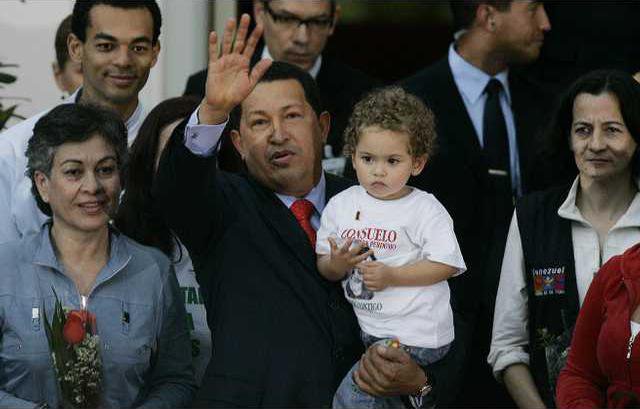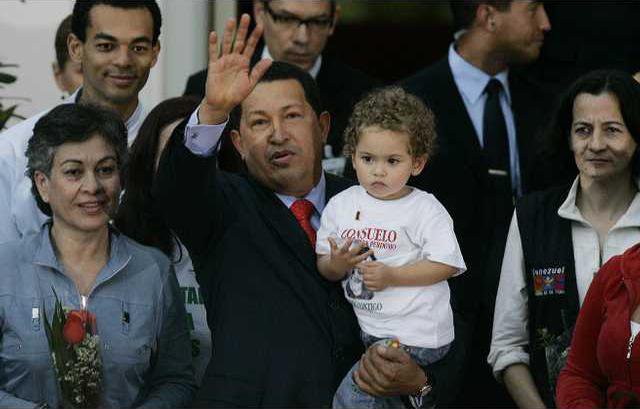CARACAS, Venezuela — President Hugo Chavez defended Colombia’s leftist rebels on Friday, urging the international community to remove them from lists of terrorist groups a day after securing the release of two women held hostage by the insurgents.
The Revolutionary Armed Forces of Colombia and the National Liberation Army ‘‘are not terrorists, they are true armies ... They must be recongnized,’’ Chavez said.
‘‘They are insurgent forces that have a political project,’’ he told lawmakers. ‘‘I say it even though someone could be bothered by it.’’
The FARC — Colombia’s largest guerrilla group — has repeatedly asked world governments to remove it from their lists of foreign terrorist organizations. Chavez echoed that call, urging European and Latin American nations to resist what he called ‘‘U.S. pressure.’’
The European Union joined Washington in classifying FARC as a terrorist group in 2002, outlawing all economic support to the guerrilla group, which is accused of large-scale drug trafficking, kidnapping and attacks on civilians.
The FARC rebels traditionally have found support among leftists in Europe, and several pro-FARC Web site are hosted there.
Chavez, a self-proclaimed revolutionary who is leading a political movement named after South America’s 19th-century independence hero Simon Bolivar, also described the political leanings of Colombia’s guerrillas as ‘‘Bolivarian.’’
The Venezuelan leader’s strong statements are likely to agitate Colombia’s U.S.-allied president, Alvaro Uribe, while raising concerns in Washington.
Chavez, meanwhile, basked in praise for winning the release of two women who were held for about six years by the FARC. Lawmakers gave a standing ovation as Chavez arrived to the National Assembly to make his annual address.
The two Colombians, Clara Rojas and Consuelo Gonzalez, were reunited Thursday with relatives who waited for them in Caracas. After tearful reunions, they met Chavez, who soaked up the attention holding Gonzalez’s 2-year-old granddaughter in his arms.
Chavez said he hoped the successful mission could be repeated for former Colombian presidential candidate Ingrid Betancourt and dozens of other captives held by the FARC. But, he said, that largely depends on Uribe.
The handover was the most important hostage release in the Colombian conflict since 2001, when the FARC freed some 300 soldiers and police officers. And it was a major victory for Chavez, whose leftist politics helped gain the trust of the rebels.
The FARC, in a statement published on a pro-rebel Web site, said the unilateral release demonstrated the group’s ‘‘unquestionable willingness’’ to engage the government in talks over the remaining hostages.
Rojas was managing Betancourt’s bid for the presidency in February 2002 when the two were kidnapped on the campaign trail. She gave birth in captivity to a boy fathered by one of the guerrillas.
Chavez said the mission demonstrated ‘‘there are possibilities’’ of securing the release of other FARC hostages, including three American defense contractors.
Chavez suggested Colombia has wrongly seen military strikes as the way out of the conflict, and said Uribe ‘‘must be called to rectify.’’
‘‘President, use me. I’m at your service,’’ he said, urging Uribe to let him to meet FARC commander Manuel Marulanda for talks.
Uribe has refused to give approval for Chavez to meet with FARC leaders on Colombian soil.
But the hostage handover increases pressure on Uribe to make concessions for the release of 44 other high-profile captives. The guerrillas have offered to trade those hostages for hundreds of rebel fighters imprisoned in Colombia and the U.S.
The Revolutionary Armed Forces of Colombia and the National Liberation Army ‘‘are not terrorists, they are true armies ... They must be recongnized,’’ Chavez said.
‘‘They are insurgent forces that have a political project,’’ he told lawmakers. ‘‘I say it even though someone could be bothered by it.’’
The FARC — Colombia’s largest guerrilla group — has repeatedly asked world governments to remove it from their lists of foreign terrorist organizations. Chavez echoed that call, urging European and Latin American nations to resist what he called ‘‘U.S. pressure.’’
The European Union joined Washington in classifying FARC as a terrorist group in 2002, outlawing all economic support to the guerrilla group, which is accused of large-scale drug trafficking, kidnapping and attacks on civilians.
The FARC rebels traditionally have found support among leftists in Europe, and several pro-FARC Web site are hosted there.
Chavez, a self-proclaimed revolutionary who is leading a political movement named after South America’s 19th-century independence hero Simon Bolivar, also described the political leanings of Colombia’s guerrillas as ‘‘Bolivarian.’’
The Venezuelan leader’s strong statements are likely to agitate Colombia’s U.S.-allied president, Alvaro Uribe, while raising concerns in Washington.
Chavez, meanwhile, basked in praise for winning the release of two women who were held for about six years by the FARC. Lawmakers gave a standing ovation as Chavez arrived to the National Assembly to make his annual address.
The two Colombians, Clara Rojas and Consuelo Gonzalez, were reunited Thursday with relatives who waited for them in Caracas. After tearful reunions, they met Chavez, who soaked up the attention holding Gonzalez’s 2-year-old granddaughter in his arms.
Chavez said he hoped the successful mission could be repeated for former Colombian presidential candidate Ingrid Betancourt and dozens of other captives held by the FARC. But, he said, that largely depends on Uribe.
The handover was the most important hostage release in the Colombian conflict since 2001, when the FARC freed some 300 soldiers and police officers. And it was a major victory for Chavez, whose leftist politics helped gain the trust of the rebels.
The FARC, in a statement published on a pro-rebel Web site, said the unilateral release demonstrated the group’s ‘‘unquestionable willingness’’ to engage the government in talks over the remaining hostages.
Rojas was managing Betancourt’s bid for the presidency in February 2002 when the two were kidnapped on the campaign trail. She gave birth in captivity to a boy fathered by one of the guerrillas.
Chavez said the mission demonstrated ‘‘there are possibilities’’ of securing the release of other FARC hostages, including three American defense contractors.
Chavez suggested Colombia has wrongly seen military strikes as the way out of the conflict, and said Uribe ‘‘must be called to rectify.’’
‘‘President, use me. I’m at your service,’’ he said, urging Uribe to let him to meet FARC commander Manuel Marulanda for talks.
Uribe has refused to give approval for Chavez to meet with FARC leaders on Colombian soil.
But the hostage handover increases pressure on Uribe to make concessions for the release of 44 other high-profile captives. The guerrillas have offered to trade those hostages for hundreds of rebel fighters imprisoned in Colombia and the U.S.

